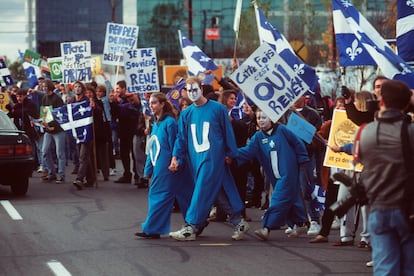Quebec parliament adopts motion calling for release of files from 1995 independence referendum
The province’s chief electoral officer is being asked for documents relating to the funding of the ‘No’ campaign run by opponents of separation from Canada


Quebec’s legislature on Thursday adopted a motion calling for the release of documents and testimonies related to the independence referendum held in that Canadian province in 1995. The motion targets information from an investigation into how opponents of separation from Canada — the federalists — funded their campaign, which narrowly won the 1995 vote.
The motion, introduced by the Parti Québecois (PQ) and unanimously approved by the regional parliament, calls on the province’s chief electoral officer to release those files “as soon as possible.” PQ leader Paul St-Pierre Plamondon described the parliamentary vote as “a great victory for Quebec’s democracy.”
On May 20, 1980, Quebec voted in a first independence referendum. That day, the No side won with 59.56% of the votes. On a second attempt made on October 30, 1995, opponents of secession won again, but this time with 50.58%; an advantage of just 54,288 votes.
In 2006, Quebec’s electoral authorities asked retired judge Bernard Grenier to carry out an investigation into the No campaign of the 1995 referendum. A year later, after summoning 90 witnesses and reviewing some 4,500 documents, Grenier submitted a report that found that two federalist organizations — Option Canada and the Canadian Unity Council — failed to report spending of $539,000, a much lower figure than the estimate provided by the media. Following the publication of the report, the documents and testimony were classified indefinitely at Grenier’s request.
At a press conference on Tuesday to announce the motion, the leader of PQ, Quebec’s main pro-independence group, said that regardless of whether one is for or against independence, or somewhere in between, the issue at hand is “a fundamental principle of transparency towards the population and respect for our democracy.”
“When we look at the United States, even the assassination of John F. Kennedy did not justify withholding documents forever,” he told reporters.
Quebec Prime Minister François Legault, leader of the Coalition for the Future of Quebec (CAQ), said he agreed with the proposal. “We have nothing to hide,” he said, although he said he needed more information about the procedure.
A considerable amount of supporters of independence continue to hold that the defeat in the 1995 referendum was due in large part to the funds allocated to the No campaign. On the night of October 30, 1995, Jacques Parizeau, Quebec’s prime minister at the time and one of the main supporters of independence, alluded to this in the concession speech he gave after learning the results of the vote. He also made a remark that, according to various analysts, considerably affected the independence movement in later years. Parizeau declared that Yes had lost “because of money and ethnic votes.” A day later, he submitted his resignation as prime minister and PQ leader.
Polls in recent years place support for Quebec’s independence at just over 30%. However, polls have also shown that it is an issue that is receiving increasingly less attention from voters. The results of the PQ at the last two elections reflect this: in 2018 it won 10 constituencies, while in 2021 it obtained only three seats.
By contrast, François Legault’s CAQ achieved resounding victories both times. Legault, a former promoter of independence who served in PQ governments, defends the idea of a strong Quebec but within the Canadian federation. Considered a conservative nationalist politician, he ended the two-party system by which the Quebec Liberal Party and the PQ took turns in power; both of these parties had structured much of their program around the independence issue.
Following the second independence referendum, in June 2000 Canadian lawmakers approved a series of conditions for future secessionist votes that take into account issues such as the wording of the question and the interpretation of the results.
Sign up for our weekly newsletter to get more English-language news coverage from EL PAÍS USA Edition
Tu suscripción se está usando en otro dispositivo
¿Quieres añadir otro usuario a tu suscripción?
Si continúas leyendo en este dispositivo, no se podrá leer en el otro.
FlechaTu suscripción se está usando en otro dispositivo y solo puedes acceder a EL PAÍS desde un dispositivo a la vez.
Si quieres compartir tu cuenta, cambia tu suscripción a la modalidad Premium, así podrás añadir otro usuario. Cada uno accederá con su propia cuenta de email, lo que os permitirá personalizar vuestra experiencia en EL PAÍS.
¿Tienes una suscripción de empresa? Accede aquí para contratar más cuentas.
En el caso de no saber quién está usando tu cuenta, te recomendamos cambiar tu contraseña aquí.
Si decides continuar compartiendo tu cuenta, este mensaje se mostrará en tu dispositivo y en el de la otra persona que está usando tu cuenta de forma indefinida, afectando a tu experiencia de lectura. Puedes consultar aquí los términos y condiciones de la suscripción digital.








































